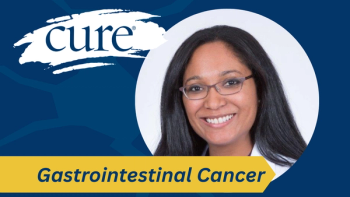
Caring for the Caregivers
A panel of caregivers drew upon personal experience to offer advice and ideas to those in this role.
ABOUT 2.8 MILLION INDIVIDUALS in the United States serve as caregivers to loved ones with cancer, according to the National Cancer Institute (NCI), yet resources for this group can be scarce.
The 2018 GI Cancer Patient Summit featured a panel discussion on the role of the caregiver and the importance of coping strategies. It was hosted in June in Bethesda, Maryland, by Hope Connections for Cancer Support and The Ruesch Center for the Cure of Gastrointestinal Cancers at Georgetown Lombardi Comprehensive Cancer Center. Hope Connections for Cancer Support (hopecon­nectionsforcancer.org) helps people with cancer and their loved ones deal with the emotional and physical effects of cancer through free support groups, educational workshops, classes on stress reduction and nutrition, and opportunities to connect with each other.
Panelists Lorraine Butler, Chuck O’Neill and Donna Parry — all caregivers — offered advice on topics including time management, coping mechanisms, decision-making and support group participation, as well as what more can be done for those in this challenging role.
“There really isn’t an awful lot of information out there for caregivers, and just as a patient is thrust into the world of cancer, it’s the same way for the caregiver — the patient and the caregiver become very interdependent immediately,” said panel host Martha Raymond, founder and CEO of the nonprofit organization The Raymond Foundation, which advocates for colon cancer education, outreach and patient empowerment. “It’s important to understand the depth of what caregivers go through, from managing physical situations to side effect management and the emotional and psychosocial effects,” she added. “There is a diverse (array) of emotions and roles.”
SHARING ADVICE
The panel offered new caregivers two key pieces of advice: Use science-based, credible sources, and be alert during clinic visits.
As part of the quest for reliable sources, they suggested, avoid message boards and look at the date on which any source materials were published. Parry, whose husband died last December after receiving a diagnosis of pancre­atic cancer in 2015, said that if information was more than a year old, she didn’t refer to it.
The panel also emphasized that a caregiver must be his or her loved one’s eye and ears during a doctor’s visit, suggesting that caregivers bring a notebook full of ques­tions and summaries. Coming prepared can prevent the common problem of patients going home without knowing what to do or expect, even if they’re already in treatment.
“Focus on the clinic and be very alert. Come in with questions and have a checklist, so if the physician doesn’t get to them all, you can bring them up,” added O’Neill, whose wife received a diagnosis of stage 4 colorectal cancer in 2015. “Also, bring good notes to summarize: What’s the game plan? What are the options we are considering? I like to think I can go home with as few questions remaining as possible … and then you feel better about the treatment and side effects and are confident that it is going to have a good effect (for your loved one).”
Panelists noted that shared decision-making between patients and caregivers may come into play when choosing treatments. “There really is no one right way to (make a decision). A caregiver and patient need to figure out what will work for them,” said Butler, whose husband received a diagnosis of stage 4 gastrointestinal cancer five years ago. “But, however much we’re in this situation together, I keep in mind that it really is his body and his disease.”
Nonetheless, Parry emphasized, if a loved one resists an aspect of his or her treatment plan, reinforcement from a friend, peer or family member can help. She drew upon her own experience, recalling how her husband refused to go to treatment on a Wednesday versus a Thursday because of his teaching schedule. Parry called on one of his colleagues for intervention. “Guess what — he went on Wednesday,” she told the crowd, smiling at the memory.
A patient’s care team should also be aware of his or her reluctance to comply with recommended treat­ment, and caregivers may be the best equipped to communicate with them about these situations.
PROVIDING SUPPORT
The NCI estimates that caregivers devote, on average, about 30 hours a week to caregiving duties alone — on top of time spent working, with family or children, running the household and more. To address potential time constraints and the related stress, which can become overwhelming, the panel emphasized that physical and mental exercise can provide a key coping mechanism.
Events like the annual GI Cancer Patient Summit and resources such as Hope Connections and support groups can also be helpful. “You think you are going through something that no one else is going through, and then you talk to somebody (and feel) relief that there is someone else going through what you are going through,” Parry said. It doesn’t change the situation, but it makes it much more bearable, she added.
The panel acknowledged that much more needs to be done for those in the caregiver role. Raymond suggested the implementation of a web-based survivorship care plan specifically for caregivers, which would provide coping mechanisms and options for connecting with individuals in similar situations.
Butler noted that adding a health care liaison to the medical team — someone who knows how to match patients to clinical trials and can translate the science of diagnosis and treatments into everyday language — could also be helpful for caregivers.
The biggest hope for addressing these concerns is the eventual cure of cancer, Parry pointed out. “The bottom line is: Let’s do everything we can to do away with the problem,” she said.




